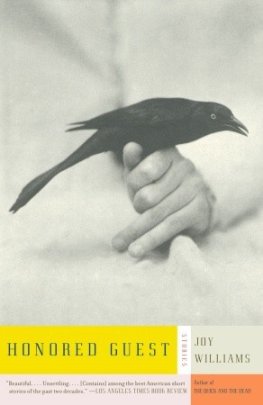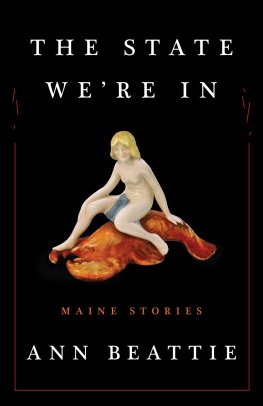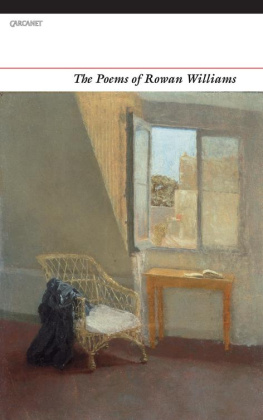Joy Williams
99 Stories of God
A woman who adored her mother, and had mourned her death every day for years now, came across some postcards in a store that sold antiques and various other bric-a-brac. The postcards were of unexceptional scenes, but she was drawn to them and purchased several of wild beaches and forest roads. When she got home, she experienced an overwhelming need to send a card to her mother.
What she wrote was not important. It was the need that was important.
She put the card in an envelope and sent it to her mothers last earthly address, a modest farmhouse that had long since been sold and probably sold again.
Within a week she received a letter, the writing on the envelope unmistakably her mothers. Even the green ink her mother had favored was the same.
The woman never opened the letter, nor did she send any other postcards to that address.
The letter, in time, though only rumored to still exist, caused her children, though grown, much worry.
The breeder of the black German shepherds said her kennel was in Sedona, a place known far and wide for its good vibrations, its harmonic integrity. But the kennel was actually in Jerome, thirty miles away, an unnerving ghost town set above a vast pit from which copper ore had been extracted. The largest building in Jerome was the old sanatorium, now derelict. The towns historian insisted that it had served all the population in the towns heyday, not just the diseased and troubled, and that babies had even been born there.
In any case, the dog coming from Jerome rather than Sedona was telling, people thought.
Another something that could be the basis of the dogs behavior was the fact that her mistress always wore sunglasses, day and night. Like everybody else, the dog never got to see her eyes. When the woman had people over, she placed a big bowl of sunglasses outside the front door and everyone put on a pair before entering. It was easier than locking the dog in the bedroom.
A noted humanist was invited to take part in a discussion about the dangers and opportunities which would arise if intelligent life forms on other planets were discovered. His remarks, though no one disagreed with them, became so heated that the producers later, in light of what had happened, decided to edit him out of the program.
There was consensus that discovering intelligent life forms on other planets was probable and even essential to the human endeavor, but much of the conversation concerned whether any life form discovered would hold a candle to human intelligence and creativity.
The humanist, who was also a noted scholar, argued that nothing could be discovered that could write a symphony, as so many of our brilliant composers had done, or be capable of appreciating the symphony. The ability to appreciate the symphony seemed to him quite as important as the actual composition of it.
The humanist/scholar became quite emotional in conceiving of the world devoid of human beings, which was a possibility brought on by one disaster or another, due, it must be said, to our own actions. This would be the worst thing he could imagine worlds devoid of human beings, even if these worlds were populated by other intelligent and enterprising life forms.
After the taping, the humanist/scholar, whose name was Charles Thaxter Ormand, the acronym of which, in the ever-evolving and vibrant field of text messaging, would be check this out, retired for lunch to one of the citys many small fine restaurants. He ordered that days special. When it was brought to him, whole and beautifully prepared and presented, he took a moment to study it before consuming it.
To his discomfort, he detected from the plate the faint sound of the most beautiful music. It was exquisite, joyous yet heartbreaking, a delicate furling of gratitude and praise gradually diminishing, then gone.
Horrified, he continued to look at the speckled trout that, according to the waiter, had been taken mere hours before from its mountain stream. Then, with a cry, he rushed into the kitchen, where he attacked both the waiter and the chef with a variety of heavy utensils before he was subdued and taken away for observation at the nearest psychiatric facility. His ravings about the trout being no more appreciated than the ravings of any of the other lunatics there.
Passing Clouds was the brand of cigarette favored by the great English contralto Kathleen Ferrier. According to one of her early teachers, her magnificent voice was attributed to a wonderful cavity at the back of her throat. This was the only explanation given for the purity and power of her voice.
Near the end of her brief life, Ferrier sang Mahlers symphony Song of the Earth. We die, but life is fresh, eternally fresh, was Mahlers ecstatic conviction. Nature renews herself year after year for ever and ever.
Ferrier was in tears when she concluded Song of the Earth, so distraught that she omitted the final ewig, the final ever.
At some point, Kafka became a vegetarian.
Afterwards, visiting an aquarium in Berlin, he spoke to the fish through the glass.
Now at last I can look at you in peace, I dont eat you anymore.
You know that dream of Tolstoys where hes in some sort of bed contraption suspended between the abyss below and the abyss above? You know that one? Well, I gave it to him, the Lord said.
Franz Kafka once called his writing a form of prayer.
He also reprimanded the long-suffering Felice Bauer in a letter: I did not say that writing ought to make everything clearer, but instead makes everything worse; what I said was that writing makes everything clearer and worse.
He frequently fretted that he was not a human being and that what he bore on his body was not a human head. Once he dreamt that as he lay in bed, he began to jump out the open window continuously at quarter-hour intervals.
Then trains came and one after another they ran over my body, outstretched on the tracks, deepening and widening the two cuts in my neck and legs.
I didnt give him that one, the Lord said.
This is an appealing story.
One day, a hermit brother about to leave for town went to a brother who lived nearby and who had continual compunction. He said to his fervent neighbor, Please do me the kindness, brother, of taking care of my garden until my return. The other replied, Believe me, brother, I will do my best not to neglect it. After the brothers departure, he said to himself, Now take care of this garden. And from evening until dawn he stood in psalmody, ceaselessly shedding tears. He prayed the same way for the entire day. Coming home late, the brother found that hedgehogs had ravaged his garden.
He said, God forgive you, brother, for not taking care of my garden.
The other answered, God knows I did my best to keep it, and I hope through Gods mercy that the little garden will bear fruit.
The brother said, But it has been completely destroyed.
The other replied, I know, but I have confidence in God that it will flower again.
But he was speaking of his continual tears, the weeping for ones sins in the hope of salvation, and of the garden of his heart, watered by him and in full flower.
A child in the south side of town was killed in a drive-by shooting. He was not the intended victim, he was only seven. There really was no

















